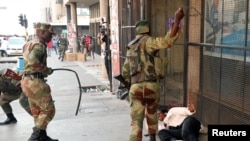On the first year anniversary of the post-election violence in Zimbabwe that left six people dead, the United States placed a former commander of Zimbabwe’s army on its targeted sanctions list, for his alleged involvement.
In a statement issued Thursday, the office of the spokesperson of the Secretary of State, wrote that it had publicly designated Anselem Nhamo Sanyatwe “due to his involvement in gross violation of human rights.”
Citing Section 7031 (c) of Foreign Operations and Related Programs Appropriation Act, the statement further stated that “the department had credible information “ of General Sanyatwe’s involvement in the crackdown against unarmed civilians.
"The Department has credible information that Anselem Nhamo Sanyatwe was involved in the violent crackdown against unarmed Zimbabweans during post-election protests on August 1, 2018 that resulted in six civilian deaths," read the statement.
Reacting to the designation, Zimbabwe’s permanent secretary of information Nick Mangwana dismissed the sanctions as wrong, and said the U.S. was unjustified in taking such actions against a citizen of Zimbabwe.
"There is no justification for any Zimbabwean citizen to be placed under sanctions, more so those sanctions that are not coming through Chapter 7 of the United Nations Security Council. So, these sanctions are not justified," said Mangwana. "We have a process in the nation where if somebody has committed a crime they will be charged for that crime, and by our institutions, but not for any country to put anyone under sanctions."
Further, Mangwana said, even the seven-member Commission of Inquiry led by former South African President Kgalema Motlanthe, that was tasked by President Emmerson Mnangagwa to investigate the August 1st killings, had not attributed blame to anyone in particular. Mangwana said Sanyatwe was never accused of firing a gun, or ordering anyone to shoot and kill.
"Even the Motlanthe Commission did not apportion blame on any particular individual," said Mangwana. "Yes they made recommendations that it would have been handled differently. But that is not to say that retired General Sanyatwe did one, two or the other."
Six people were gunned down last August following protests over delays by the Zimbabwe Electoral Commission in announcing presidential election results of the July 30 poll.
However, political analysts Ernest Mudzengi said the sanctions against Sanyatwe, were appropriate, given that no one has been held accountable for the killings.
"The truth of the matter is that if at all government is prepared to implement reforms, then we should be seeing things on the ground," said Mudzengi. "We as citizens of Zimbabwe we are not seeing much, and its now that a foreign country has done this, but we are speaking the same language. We are saying that we have not seen reforms."
Mudzengi said the sanctions against Sanyatwe, and his wife, Chido Machona, strongly indicate lack of confidence in the Zimbabwe government’s commitment to reform.
"I think that move simply shows that we are still to achieve anything significant in terms of political and economic reforms in the country," Mudzengi said.
"In fact, this measure by the United States, is a painful measure in that it shows us that the country has not moved. We are still in the old era, yet we need to move into a new era." said Mudzengi.
Mangwana however, stressed that the government has not dropped the ball on bringing justice to the victims of the August 1st killings, and said the government will arrest anyone found guilty of involvement in the post-election violence.
"These issues, the bit about people being held to account, its being investigated," assured Mangwana. "The army is playing it's role investigating, the intelligence and the police are playing their role in gathering evidence, and people will be put before the court and be tried if there is enough evidence, or weight of evidence against them," he said.




